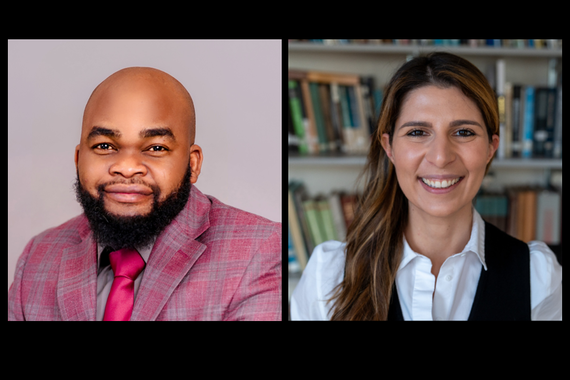Universal Search
“In every aspect of life, you can find something for which statistics is useful,” says Assistant Professor Sara Algeri. “This is why I originally chose statistics,” she continues, “because at 18 years old, I didn’t know what I wanted to do for the rest of my life, and I wanted to leave my options open.” A few college degrees, many countries, and one PhD later, Algeri has found a home in astrostatistics.
An International Experience
Algeri grew up in Italy, where she received her bachelor's degree in statistics and information management and her master’s degree in biostatistics. She studied biostatistics because she could clearly recognize the practical applications of statistics in the subject. In her own words, “I can only work on a theory if I know why it's useful—if I can see how people use it in practice.”
It wasn’t until Algeri was in Texas working toward another master’s degree in statistics that she first discovered the field of astrostatistics. Combining her love for statistics and her interest in physics, she knew it was the right path for her.
When she started applying to schools for her PhD, Algeri reached out to an advisor in London who is famous for his work in astrostatistics. With the help of this advisor and an astroparticle physicist as co-advisor in Stockholm, Algeri got to dive firsthand into the world of dark matter.
The Search for Dark Matter
Algeri’s current research questions all come from high-energy physics and astrophysics problems, in particular, from problems relating to the discovery of dark matter.
CERN, a Switzerland-based organization working to uncover what the universe is made of, explains, “Unlike normal matter, dark matter does not interact with the electromagnetic force. This means it does not absorb, reflect, or emit light, making it extremely hard to spot. In fact, researchers have been able to infer the existence of dark matter only from the gravitational effect it seems to have on visible matter.” As Algeri defines it, “Dark matter is essentially this portion of matter in the universe that people think exists because none of the physics theories would make sense if it didn’t, but no one has ever detected it.”
Although physicists are usually the ones solving these complex problems, they have to use statistical models to do so, and that’s where Algeri comes in. “Statistics is essential to the discovery of dark matter and other astrophysical phenomena. Even if you find something abnormal in your data, you don’t know if it’s because there is something interesting there, or if it’s just by chance,” she explains.
Algeri is attempting to create a statistical method that works for solving many of these physics problems, instead of just a specific one. If you start with the wrong model, you’re going to get the wrong results. “That’s the problem I am currently trying to solve,” Algeri says. “I want to create a tool that can help to detect new signals, even if the model you started from is incorrect.”
From Research to Education
Since joining the School of Statistics in the fall of 2018, Algeri has taken on an additional role as an educator. “Teaching is actually quite rewarding if it goes well.” She credits her success as a teacher to her educational experiences around the globe. “The way I teach is a mixture of all the countries I’ve been a student in,” she says. “I can combine the things that worked for me into one teaching style.”
As far as Algeri's plans for the future, she says, “I would love to keep teaching. Some people say it’s demanding to do research and teach, but I find it rewarding to see the students engaged and happy.” But more than anything she is thrilled to carry on her research and is dedicated to making statistics flourish at the center of all science, because, “the beauty of conducting research in statistics is that you can apply it to whatever you want—even dark matter.”
This story was written by an undergraduate student in CLA.



